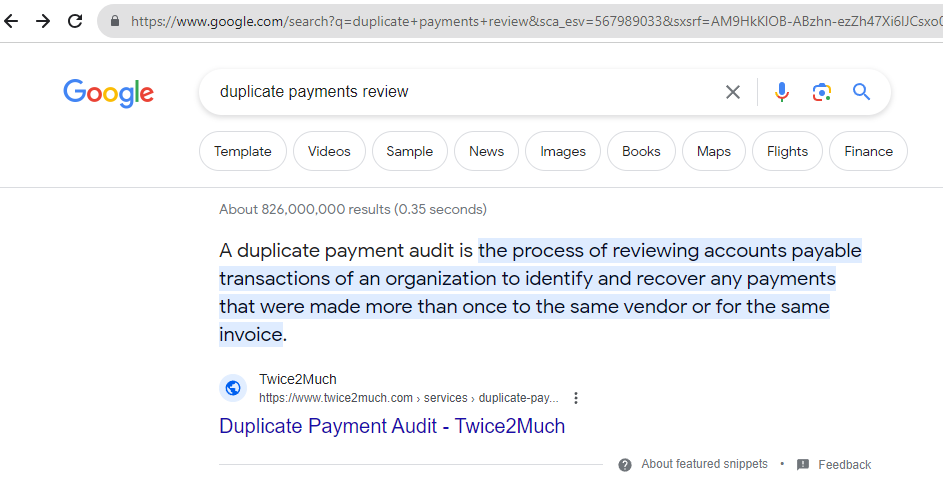Well according to Google, a duplicates payment review is 'the process of reviewing accounts payable transactions of an organisation to identify and recover any payments that were made more than once to the same vendor' as explained on the Twice2Much website.

A Duplicate Payments Review refers to an audit process or an internal control activity designed to identify and rectify any duplicate payments made by an organization. Duplicate payments can occur for various reasons, including human error, system glitches, or lack of proper controls. These overpayments can lead to financial losses for the organization.
Key features and steps in a Duplicate Payments Review typically include:
1. Data Collection: Gather payment data from the organization's accounts payable system or financial software.
2. Data Analysis: Using specialized software or manual methods, analysts will sort and analyze payment data to identify potential duplicates. This might involve looking for repeated invoice numbers, matching payment amounts made on the same or close dates, or similar vendor details.
3. Verification: Once potential duplicates are identified, each entry is verified to determine if it is genuinely a duplicate payment. This could involve reviewing supporting documents like invoices, purchase orders, and payment vouchers.
4. Recovery: If a genuine duplicate payment is found, steps are taken to recover the funds. This may involve contacting the vendor and arranging for a refund or applying the overpayment against future purchases.
5. Reporting: A detailed report is generated at the end of the review, outlining the findings, the amounts recovered, and any recommendations to prevent future duplicate payments.
6. Preventative Measures: Based on the findings from the review, the organization can then implement additional controls or enhance existing processes to minimize the risk of future duplicate payments. This might include improved software, better training for staff, or more rigorous oversight and reconciliation processes.
Conducting regular Duplicate Payments Reviews is crucial for organizations to ensure financial accuracy, maintain vendor relationships, and safeguard against unintentional financial losses.

When Should an Accounts Payable Department Conduct a Duplicate Payments Review?
Top of Page
Conducting a Duplicate Payments Review is crucial for ensuring the financial integrity and accuracy of an organization's payments. Here are several scenarios or timelines when an Accounts Payable (AP) department should consider conducting a Duplicate Payments Review:
1. Routine Basis: It's a good practice for AP departments to conduct these reviews on a routine basis, whether quarterly, semi-annually, or annually. Regular reviews help in catching errors proactively and can be part of the organization's standard internal control procedures.
2. System Upgrades or Changes: Whenever there's an upgrade or a change in the accounting or payment software, it's advisable to conduct a review. Software transitions can sometimes lead to errors, including duplicate payments.
3. Staff Turnover or Reorganization: If the AP department undergoes significant staff changes or restructuring, a review can be beneficial. New personnel might not be familiar with the organization's systems and procedures, increasing the likelihood of errors.
4. Post-Audit Findings: If an internal or external audit highlights issues in the payment processes, it can be a prompt to conduct a more focused review to address the concerns raised.
5. Vendor Feedback: Sometimes, vendors might point out that they've received duplicate payments or there are discrepancies in accounts. This feedback should be a trigger to examine not just those particular transactions but also to carry out a broader review to check for other potential duplicates.
6. Increased Volume of Transactions: If the organization experiences a sudden increase in the volume of transactions, this can increase the risk of errors. It might be a good time to review payments, especially if the increase was unexpected or unplanned.
7. Preventative Measure: Even if there isn't a particular trigger, conducting occasional random reviews can act as a preventative measure. It sends a message to the team about the importance of accuracy and can act as a deterrent for any fraudulent activities.
8. Before Closing Financial Books: Before finalizing year-end financial statements, it's essential to ensure that all liabilities, including payables, are accurately recorded. A review can ensure that duplicate payments, if any, are rectified before the financial statements are closed.
By integrating these reviews into the AP department's routine or triggering them based on specific events, organizations can ensure better financial management, foster trust with vendors, and avoid unnecessary financial losses.

What are the Signs that We Might Need a Duplicate Payments Review?
Top of Page
Recognizing the signs that suggest a need for a Duplicate Payments Review can save an organization from unnecessary financial losses and improve its accounts payable processes. Here are some common indicators that an organization might need to conduct such a review:
1. Recurring Vendor Inquiries: If vendors consistently inquire about payment discrepancies, or if they report having received multiple payments for the same invoice, this is a clear indication.
2. Lack of Reconciliation: Regular reconciliation of vendor statements with your accounts payable records is crucial. If these haven't been performed regularly, or discrepancies consistently arise during reconciliations, it may signal the need for a review.
3. Absence of a Robust Approval Process: If there isn't a stringent invoice approval process in place or if the process is not consistently followed, there's an increased risk of errors.
4. High Staff Turnover in AP: Frequent changes in the AP department or insufficient training for new staff can lead to mistakes in the payment process.
5. Inconsistent or Missing Documentation: If there's a lack of consistency in the supporting documentation for payments (like purchase orders, receiving reports, and invoices), or if these documents are frequently missing, there's a higher risk of duplicate payments.
6. Payment Process Irregularities: If you notice that rush payments are frequently made or there are many manual checks being issued outside the regular payment process, these could be red flags.
7. Issues Highlighted in Audits: If internal or external audits point out deficiencies in the payment process or specific instances of duplicate payments, it's a clear sign that a more comprehensive review is needed.
8. Software or System Glitches: If your financial or AP software experiences frequent glitches, or if data migration and system integration problems are reported, there's an increased likelihood of duplicates.
9. Mismatched Reports: If there are inconsistencies between various financial reports, especially concerning accounts payable, this might indicate problems in the payment process.
10. Absence of Automated Controls: Modern AP software solutions often come with built-in controls to detect and prevent duplicate payments. If your organization isn't using such software or hasn't activated these controls, you're at a higher risk.
11. Frequent Exceptions: If the AP team is constantly making exceptions to the standard processes due to unique circumstances, it can be a signal that controls aren't effective, leading to potential duplicates.
12. Inadequate Vendor Master Data Maintenance: If there's no regular review and cleanup of the vendor master data, you might have multiple entries for the same vendor, leading to potential duplicate payments.
Identifying these signs early and taking proactive steps, including conducting a Duplicate Payments Review, can help ensure the accuracy and integrity of the accounts payable process.

What Could We Hope to Recover in a Duplicate Payment Review?
Top of Page
When conducting a Duplicate Payments Review, organizations aim to identify and recover overpayments resulting from errors, oversight, or lack of controls in the payment process. Here's what an organization can hope to recover and achieve through such a review:
1. Financial Recovery: The most immediate and apparent benefit is the recovery of duplicate payments. Depending on the size and complexity of the organization, this could range from a few hundred to several thousands or even millions of dollars.
2. Interest on Overpayments: In some cases, especially if the duplicate payment has been outstanding for a long time, organizations might also recover interest on the overpaid amount, based on the terms agreed upon with the vendor or as per applicable laws.
3. Credits from Vendors: Instead of a direct refund, some vendors might offer credits against future purchases. These credits can be applied to offset future expenses, providing financial relief to the organization.
4. Improved Vendor Relationships: Addressing and rectifying overpayments can enhance the trust and transparency between an organization and its vendors. It demonstrates responsibility and accountability on the organization's part.
5. Insights into Process Weaknesses: The review can provide valuable insights into areas of the payment process that are prone to errors. This can help in pinpointing the root causes of the duplicates.
6. Strengthened Internal Controls: Post-review, organizations often enhance their internal controls and processes to prevent future overpayments. This could involve the implementation of new software, better training, or more rigorous oversight.
7. Mitigation of Fraud Risks: By identifying weak spots in the payment process, the organization can reduce the risk of fraudulent activities in the future. Addressing these vulnerabilities is crucial for financial security.
8. Better Cash Flow Management: Recovering overpaid funds can provide an immediate boost to the organization's cash flow, allowing for more accurate financial planning and forecasting.
9. Enhanced Reputational Image: Demonstrating a proactive approach to correcting errors and ensuring financial integrity can enhance the organization's image among stakeholders, including investors, employees, and partners.
10. Documentation and Reporting: An organization will have detailed reports and documentation post-review, which can be helpful for audits, regulatory compliance, and internal record-keeping.
11. Operational Efficiencies: As processes are refined post-review, the entire accounts payable function might experience operational efficiencies, reducing processing times and costs.
While the immediate monetary recovery is a tangible benefit of a Duplicate Payments Review, the longer-term advantages, like process improvements and enhanced relationships, can have lasting positive impacts on an organization's financial health and operational effectiveness.

How Long does a Typical Duplicate Payments Review Take?
Top of Page
The duration of a Duplicate Payments Review can vary based on several factors, including the size and complexity of the organization, the volume of transactions being reviewed, the period under review, the tools and methodologies being used, and the specific goals of the review. Here's a general breakdown:
1. Small to Medium-Sized Organizations:
- For a smaller volume of transactions or a limited review period, such as a year or two, the review might take anywhere from a few days to several weeks.
2. Large Organizations or Complex Environments:
- In entities with a high volume of transactions or for a more extended review period, the process can take several weeks to a few months.
Factors influencing the duration include:
- Scope of Review: If you're reviewing several years of payments or multiple business units, it will naturally take longer.
- Complexity of Transactions: Businesses with multifaceted payment arrangements, multiple banking relationships, or complex vendor agreements might require more in-depth analysis.
- Data Quality and Availability: If data is fragmented, missing, or of low quality, it can prolong the review process. Conversely, high-quality, centralized, and digitalized data can expedite the review.
- Tools and Technology: Using specialized software or automated tools can significantly speed up the review process compared to manual methods.
- Team Size and Expertise: A larger, experienced review team can work more efficiently than a smaller or less experienced team.
- Response Time from Vendors: When reaching out to vendors for clarifications or recoveries, their response time can impact the duration.
- Internal Processes and Approvals: The internal procedures of an organization, including the need for various approvals or consultations, can influence the time taken.
- Findings and Rectifications: If numerous issues are found, the rectification and recovery process can extend the duration.
As a best practice, before starting a Duplicate Payments Review, it's beneficial to establish a clear timeline, considering the above factors. Regular updates and check-ins can help in tracking the progress and making necessary adjustments.

Should I Outsource a Duplicate Payments Review?
Top of Page
Outsourcing a Duplicate Payments Review has both advantages and disadvantages. Whether or not to outsource largely depends on your organization's specific situation, needs, and resources. Here are some pros and cons to consider:
Advantages of Outsourcing:
1. Expertise: Third-party firms specializing in duplicate payment reviews often bring a wealth of experience and have honed methodologies to detect overpayments. They might spot issues that an internal team might miss.
2. Advanced Tools: Specialized firms often have access to advanced auditing and data analysis tools that might not be readily available within your organization.
3. Impartiality: External reviewers provide an unbiased perspective, which can be especially valuable if there's any concern about internal conflicts of interest or biases.
4. Efficiency: External experts can sometimes complete reviews faster than internal teams, especially if your internal team has other pressing responsibilities.
5. Training: By working alongside an external team, your internal staff might gain new skills or insights into best practices.
6. Risk Reduction: Professional firms can help ensure thoroughness, potentially reducing the risk of future overpayments.
Disadvantages of Outsourcing:
1. Cost: Engaging an external firm can be expensive. However, it's essential to weigh this against the potential financial recoveries and long-term benefits.
2. Data Privacy: Sharing sensitive financial data with an external entity always carries some risk, even if confidentiality agreements are in place.
3. Internal Resistance: Staff might be resistant or defensive about external reviewers evaluating their work, which can lead to friction.
4. Loss of Organizational Knowledge: External reviewers might not have the deep organizational knowledge that internal staff possess, which could potentially lead to misunderstandings or oversights.
5. Dependency: Relying solely on external audits might create a dependency, preventing the internal team from developing the necessary skills to perform these reviews independently in the future.
Things to Consider:
- Current Resources: If your organization lacks the necessary tools or skilled personnel to conduct the review effectively, outsourcing might be a more viable option.
- Volume and Complexity: A large volume of transactions or a highly complex payment environment might necessitate specialized expertise.
- Frequency: If you plan to conduct these reviews frequently, it might be worth investing in internal capabilities. However, for one-off or infrequent reviews, outsourcing could be more cost-effective.
- Budget: Consider the cost of outsourcing versus the potential recoveries and long-term savings from process improvements.
In conclusion, the decision to outsource a Duplicate Payments Review should be based on a careful analysis of your organization's needs, capabilities, and strategic objectives. If you choose to outsource, ensure that you select a reputable firm with a track record of success in this area.
We believe in outsourcing because of several factors.
- Automated controls erode the feeling of trust that management have in employees
- If you treat people like a threat to the business then that is what they may be turned into
- Extra steps in any process reduce morale
- External audits cost nothing other than a percentage of money already lost, which is a positive in every rational sense
- External auditors have a huge experience and specialist tools to conquer and errors that are made and recover the money
- No one is to blame as all of the mistakes are corrected outside of the business and returned to the company's bottom line.
Our recommended partner for a duplicate payments review is Twice2Much, the duplicate payment recovery specialists. We believe that your accounts payable recoveries can be in no safer hands.